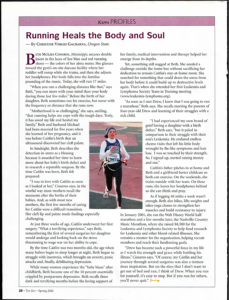Running heals the body and soul

Beth McLees Cisneros, Mississippi, secures knots in the laces of her blue and red running shoes — the colors of her alma mater. She glances toward the gym’s on-site daycare facility where her toddler will romp while she trains, and then she adjusts headphones. Her body falls into the familiar pounding of the music. Today, she will run 17 miles.
“When you run a challenging distance like that,” says Beth, “you run more with your mind than your body during those last few miles.” Before the birth of her daughter, Beth sometimes ran for exercise, but never with the frequency or distance that she runs now.
“Motherhood is so challenging,” she says, smiling, “that running helps me cope with the tough days. Truly, it has saved my life and healed my family.”
Beth and husband Michael had been married for five years when she learned of her pregnancy, and it was before Caitlin’s birth that an ultrasound discovered her cleft palate.
In hindsight, Beth describes the detection in-utero as a blessing because it awarded her time to learn more about the baby’s birth defect and to research a reputable surgeon. By the time Caitlin was born, Beth felt prepared.
“I was in love with Caitlin as soon as I looked at her,” Cisneros says, in the wistful way most mothers recall the moments after the births of their babies. And, as with most new mothers, the first few months of caring for Caitlin were a difficult transition. Her cleft lip and palate made feedings especially challenging.
After just three weeks of age, Caitlin underwent her first surgery. “What a terrifying experience,” says Beth, remembering the first of several surgeries her daughter would undergo and looking back on the stress threatening to wage war on her ability to cope.
By the time Caitlin was two months old, the age when many babies begin to sleep longer at night, Beth began to struggle with insomnia, which brought on anxiety, panic attacks, and finally, debilitating depression.
While many women experience the “baby blues” after childbirth, Beth became one of the 10 percent essentially crippled by postpartum depression. Beth recalls three dark and terrifying months before the loving support of her family, medical intervention and therapy helped her emerge from its depths.
Yet, something still nagged at Beth. She needed achallenge outside the home but without sacrificing her dedication to remain Caitlin’s stay-at-home mom. She hersearched for something that could drain the stress from her body before it could build up to destructive levels again. That’s when she attended her first Leukemia and Lymphoma Society Team in Training meeting (www.leukemia-lymphoma.org).
“As soon as I met Drew, I knew that I was going to run a marathon,” Beth says. She recalls meeting the parents of four-year-old Drew and learning of their struggles with a sick child.
“I had experienced my own brand of grief having a daughter with a birth defect,” Beth says, “but it paled in comparison to their struggle with their son’s Leukemia. He endured endless chemo visits that left his little body wroght by flu-like symptoms and hair loss. I was so touched by their strength. So I signed up, started raising money, and ran.”
Caitlin’s father pitches in at home and Beth and a girlfriend barter childcare so both can exercise. On the weekends, she trains outside with her team. On these runs, she leaves her hadphones behind so she can think and pray.
As if logging 40 miles a week wasn’t enough, Beth also bikes, lifts weights, and takes yoga classes to strengthen her muscles and build resistance to injury. In January 2001, she ran the Walt Disney World half-marathon and a few months later, the Nashville Country Music Marathon, where she raised $8,500 for the Leukemia and Lymphoma Society to help fund research for Leukemia and other blood related illnesses. She remains a mentor for the organization, helping recruit members and reach their fundraising goals.
“Drew has become such a powerful force in my life as I watch his strength and grace while battling his illness,” Cisneros says. “Of course, my Caitlin and her journey through several surgeries was also a tremendous inspiration. But on the days that I don’t want to get out of bed and run, I think of Drew. When you run for yourself, it’s easy to stop. But if you run for others, you’ll never quit.”